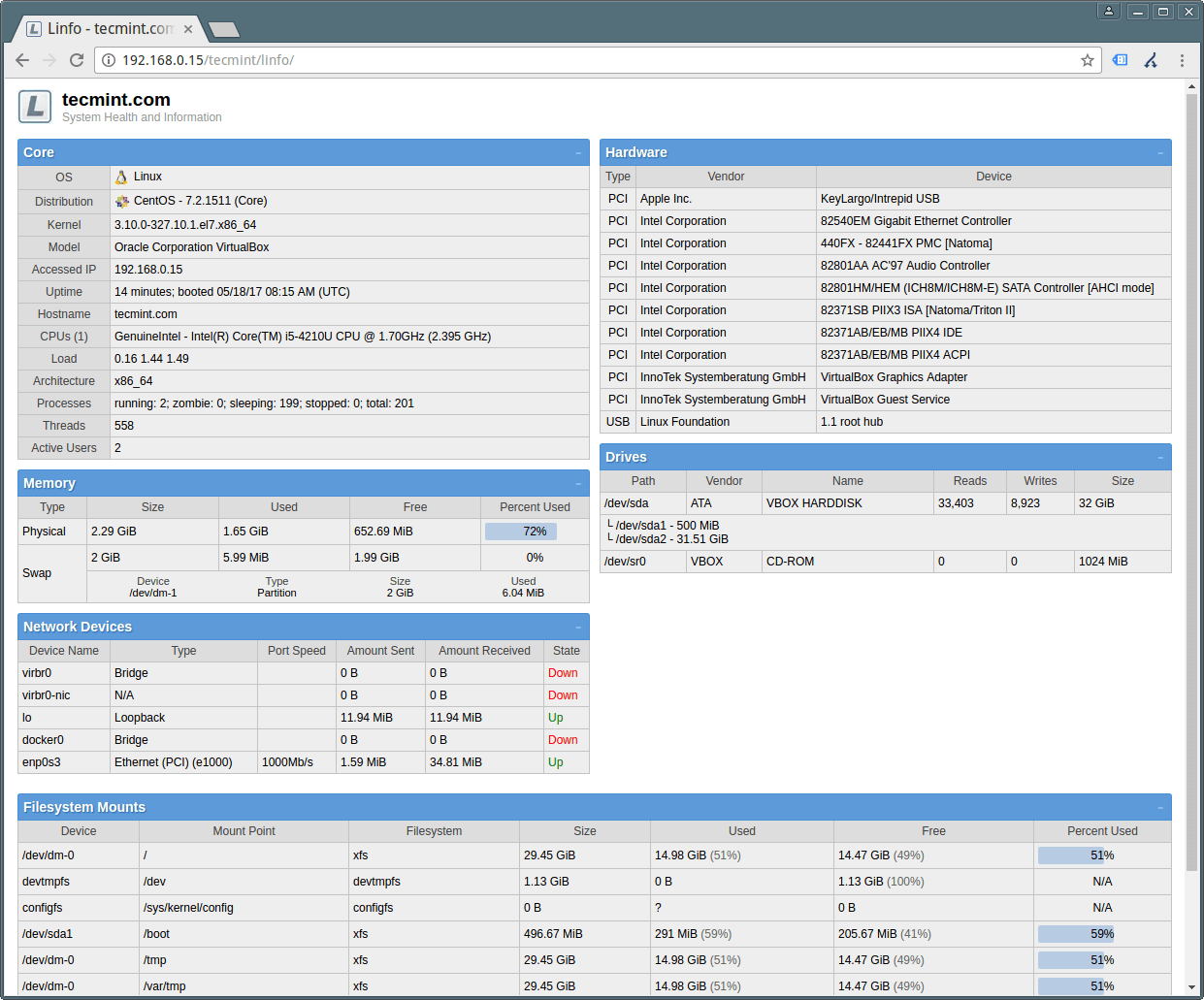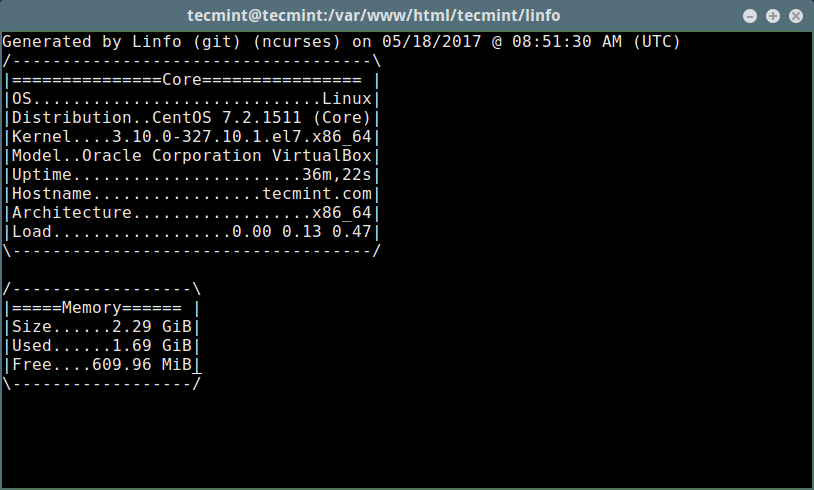mirror of
https://github.com/LCTT/TranslateProject.git
synced 2025-01-07 22:11:09 +08:00
131 lines
5.0 KiB
Markdown
131 lines
5.0 KiB
Markdown
|
|
Linfo – Shows Linux Server Health Status in Real-Time
|
|||
|
|
============================================================
|
|||
|
|
|
|||
|
|
|
|||
|
|
Linfo is a free and open source, cross-platform server statistics UI/library which displays a great deal of system information. It is extensible, easy-to-use (via composer) PHP5 library to get extensive system statistics programmatically from your PHP application. It’s a Ncurses CLI view of Web UI, which works in Linux, Windows, *BSD, Darwin/Mac OSX, Solaris, and Minix.
|
|||
|
|
|
|||
|
|
It displays system info including [CPU type/speed][2]; architecture, mount point usage, hard/optical/flash drives, hardware devices, network devices and stats, uptime/date booted, hostname, memory usage (RAM and swap, if possible), temperatures/voltages/fan speeds and RAID arrays.
|
|||
|
|
|
|||
|
|
#### Requirements:
|
|||
|
|
|
|||
|
|
* PHP 5.3
|
|||
|
|
|
|||
|
|
* pcre extension
|
|||
|
|
|
|||
|
|
* Linux – /proc and /sys mounted and readable by PHP and Tested with the 2.6.x/3.x kernels
|
|||
|
|
|
|||
|
|
### How to Install Linfo Server Stats UI/library in Linux
|
|||
|
|
|
|||
|
|
First, create a Linfo directory in your Apache or Nginx web root directory, then clone and move repository files into `/var/www/html/linfo` using the [rsync command][3] as shown below:
|
|||
|
|
|
|||
|
|
```
|
|||
|
|
$ sudo mkdir -p /var/www/html/linfo
|
|||
|
|
$ git clone git://github.com/jrgp/linfo.git
|
|||
|
|
$ sudo rsync -av linfo/ /var/www/html/linfo/
|
|||
|
|
```
|
|||
|
|
|
|||
|
|
Then rename sample.config.inc.php to config.inc.php. This is the Linfo config file, you can define your own values in it:
|
|||
|
|
|
|||
|
|
```
|
|||
|
|
$ sudo mv sample.config.inc.php config.inc.php
|
|||
|
|
```
|
|||
|
|
|
|||
|
|
Now open the URL `http://SERVER_IP/linfo` in web browser to see the Web UI as shown in the screenshots below.
|
|||
|
|
|
|||
|
|
This screenshot shows the Linfo Web UI displaying core system info, hardware components, RAM stats, network devices, drives and file system mount points.
|
|||
|
|
|
|||
|
|
[][4]
|
|||
|
|
|
|||
|
|
Linux Server Health Information
|
|||
|
|
|
|||
|
|
You can add the line below in the config file `config.inc.php` to yield useful error messages for troubleshooting purposes:
|
|||
|
|
|
|||
|
|
```
|
|||
|
|
$settings['show_errors'] = true;
|
|||
|
|
```
|
|||
|
|
|
|||
|
|
### Running Linfo in Ncurses Mode
|
|||
|
|
|
|||
|
|
Linfo has a simple ncurses-based interface, which rely on php’s ncurses extension.
|
|||
|
|
|
|||
|
|
```
|
|||
|
|
# yum install php-pecl-ncurses [On CentOS/RHEL]
|
|||
|
|
# dnf install php-pecl-ncurses [On Fedora]
|
|||
|
|
$ sudo apt-get install php5-dev libncurses5-dev [On Debian/Ubuntu]
|
|||
|
|
```
|
|||
|
|
|
|||
|
|
Now compile the php extension as follows
|
|||
|
|
|
|||
|
|
```
|
|||
|
|
$ wget http://pecl.php.net/get/ncurses-1.0.2.tgz
|
|||
|
|
$ tar xzvf ncurses-1.0.2.tgz
|
|||
|
|
$ cd ncurses-1.0.2
|
|||
|
|
$ phpize # generate configure script
|
|||
|
|
$ ./configure
|
|||
|
|
$ make
|
|||
|
|
$ sudo make install
|
|||
|
|
```
|
|||
|
|
|
|||
|
|
Next, if you successfully compiled and installed the php extension, run the commands below.
|
|||
|
|
|
|||
|
|
```
|
|||
|
|
$ sudo echo extension=ncurses.so > /etc/php5/cli/conf.d/ncurses.ini
|
|||
|
|
```
|
|||
|
|
|
|||
|
|
Verify the ncurses.
|
|||
|
|
|
|||
|
|
```
|
|||
|
|
$ php -m | grep ncurses
|
|||
|
|
```
|
|||
|
|
|
|||
|
|
Now run the Linfo.
|
|||
|
|
|
|||
|
|
```
|
|||
|
|
$ cd /var/www/html/linfo/
|
|||
|
|
$ ./linfo-curses
|
|||
|
|
```
|
|||
|
|
[][5]
|
|||
|
|
|
|||
|
|
Linux Server Information
|
|||
|
|
|
|||
|
|
The following features yet to be added in Linfo:
|
|||
|
|
|
|||
|
|
1. Support for more Unix operating systems (such as Hurd, IRIX, AIX, HP UX, etc)
|
|||
|
|
|
|||
|
|
2. Support for less known operating systems: Haiku/BeOS
|
|||
|
|
|
|||
|
|
3. Extra superfluous features/extensions
|
|||
|
|
|
|||
|
|
4. Support for [htop-like][1] features in ncurses mode
|
|||
|
|
|
|||
|
|
For more information, visit Linfo Github repository: [https://github.com/jrgp/linfo][6]
|
|||
|
|
|
|||
|
|
That’s all! From now on, you can view a Linux system’s information from within a web browser using Linfo. Try it out and share with us your thoughts in the comments. Additionally, have you come across any similar useful tools/libraries? If yes, then give us some info about them as well.
|
|||
|
|
|
|||
|
|
--------------------------------------------------------------------------------
|
|||
|
|
|
|||
|
|
作者简介:
|
|||
|
|
|
|||
|
|
Aaron Kili is a Linux and F.O.S.S enthusiast, an upcoming Linux SysAdmin, web developer, and currently a content creator for TecMint who loves working with computers and strongly believes in sharing knowledge.
|
|||
|
|
|
|||
|
|
---------------
|
|||
|
|
|
|||
|
|
via: https://www.tecmint.com/linfo-shows-linux-server-health-status-in-real-time/
|
|||
|
|
|
|||
|
|
作者:[ Aaron Kili ][a]
|
|||
|
|
译者:[译者ID](https://github.com/译者ID)
|
|||
|
|
校对:[校对者ID](https://github.com/校对者ID)
|
|||
|
|
|
|||
|
|
本文由 [LCTT](https://github.com/LCTT/TranslateProject) 原创编译,[Linux中国](https://linux.cn/) 荣誉推出
|
|||
|
|
|
|||
|
|
[a]:https://www.tecmint.com/author/aaronkili/
|
|||
|
|
[1]:https://www.tecmint.com/install-htop-linux-process-monitoring-for-rhel-centos-fedora/
|
|||
|
|
[2]:https://www.tecmint.com/corefreq-linux-cpu-monitoring-tool/
|
|||
|
|
[3]:https://www.tecmint.com/rsync-local-remote-file-synchronization-commands/
|
|||
|
|
[4]:https://www.tecmint.com/wp-content/uploads/2017/05/Linux-Server-Health-Information.png
|
|||
|
|
[5]:https://www.tecmint.com/wp-content/uploads/2017/05/Linux-Server-Information.png
|
|||
|
|
[6]:https://github.com/jrgp/linfo
|
|||
|
|
[7]:https://www.tecmint.com/author/aaronkili/
|
|||
|
|
[8]:https://www.tecmint.com/10-useful-free-linux-ebooks-for-newbies-and-administrators/
|
|||
|
|
[9]:https://www.tecmint.com/free-linux-shell-scripting-books/
|